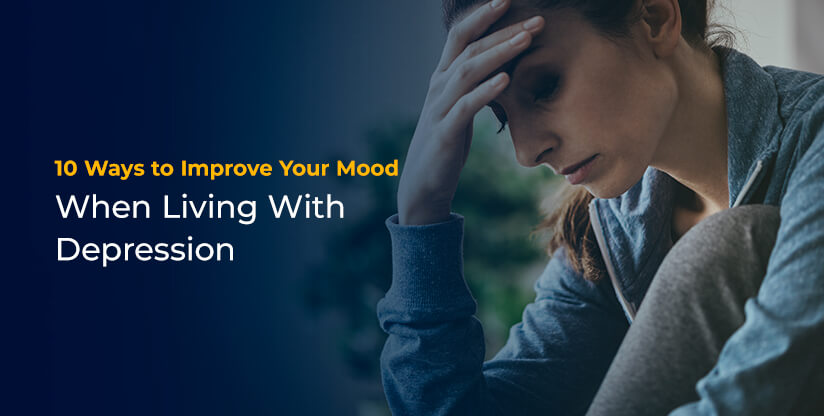- Mar 27
- Mental Health Treatment

Depression can lower your mood and impact your ability to complete everyday tasks. You might find it challenging to get out of bed, enjoy the activities you once loved or stay on top of work and household tasks. Luckily, depression is highly treatable, and there are several ways to improve your mood so you can live a more rewarding, happier life. From journaling and working out to immersing yourself in nature, continue reading for some tips on how to improve your mood.
1. Build a Support Network
Having a support system is crucial when you’re going through depression. A support system might include friends or trusted family members. You may also seek support from a counselor, mentor, co-worker, or support group. These relationships are essential, as the people closest to you can validate your feelings, extend compassion and listen to you during times of need. They can also be an excellent source of encouragement if you pursue counseling or seek professional support for your depression.
2. Take Care of Your Physical Health
To care for your mind, it’s essential to care for your body. Research consistently shows a clear link between diet, exercise and mental health. Eating a healthy, nutritious diet can help treat mental illness symptoms, while exercise stimulates the release of endorphins, which can improve your mood and decrease stress.
If you’re feeling unmotivated, start slow by revisiting your idea of movement. Instead of thinking of going for a run or playing a sport, try a short walk, gentle stretching, or chair yoga. Then, if and when you feel up to it, you can incorporate other activities like swimming, dancing or biking.
3. Improve Your Sleep Habits
Like exercising and eating well, getting enough sleep is crucial when struggling with depression. Depression can cause sleep disturbances, and people who do not get enough sleep can experience lower moods and stress. While you might find it difficult to fall asleep or get out of bed due to exhaustion, good sleep hygiene might help you improve your sleep quality.
A few tips include turning off your electronics at least an hour before bed and participating in a relaxing activity. If you’re a light sleeper, a white noise machine might help you stay asleep throughout the night so you wake up feeling refreshed. You could also try wearing a sleep mask if light sensitivity keeps you awake.
4. Create a Wellness Toolbox
A wellness toolbox is a set of activities and strategies that improve your mood when you are feeling down. Carefully consider what helps you the most as you create your list. You might listen to a song that makes you happy or hike in nature. Look to your list in times of stress and treat yourself.
Here are some ideas you might include in your wellness toolbox:
- Cuddle a pet.
- Take a warm bath.
- Drink a hot cup of tea or cocoa.
- Read a favorite book.
- Call a loved one.
- Cozy up with a soft blanket.
- Watch a favorite movie or TV show.
- Eat a favorite meal.
- Spend time journaling.
- Paint, draw, or make other art.
- Listen to your favorite music.
5. Practice Mindfulness
Mindfulness activities are among the many crucial tips to improve your mood. Practicing mindfulness involves paying attention to your present thoughts, emotions, and sensations without judging them. One study found that mindfulness is related to lower levels of depression and anxiety since it can remedy symptoms like worry and rumination.
You might practice breathing techniques, meditation, or yoga to reap the benefits of mindfulness. However, it is also helpful to keep in mind that these practices require just that: practice. Learning about and practicing these techniques when you are not in a stressful situation will help you apply them when you need them most because the brain naturally defaults to what it knows when under stress.

6. Immerse Yourself in Nature
Numerous studies show the positive impact nature has on our moods. Getting outside and immersing yourself in green spaces can improve sleep, increase happiness and reduce negative emotions. Nature can also inspire us to think more creatively while improving attention and memory in people with depression. So, when feeling down, head to a park or walk around the block to experience all that nature has to offer.
7. Simplify Your Life
Stress can magnify symptoms of depression, making it essential to simplify your life and stay organized. Approach your daily tasks one at a time, breaking larger ones into smaller ones. That way, tasks won’t pile up, and you can stay stress-free when you’re experiencing bouts of depression or anxiety.
While depression can make it challenging to manage your time, setting deadlines and working on short-term goals can help you get those essential tasks done first. With each task you accomplish, you’ll feel more satisfied as you break the pattern of procrastination.
8. Continue Engaging in Hobbies
While depression might make previously enjoyable hobbies seem less attractive, keeping up with these activities is crucial for your well-being. Try to participate in the activities you typically enjoy, even if they don’t seem appealing right now. You might read, draw, write, or get outside and hike — anything that can get your mind off depressing thoughts can help you improve your mood when you’re struggling.
9. Create a Gratitude Journal
Gratitude can be an effective antidote when you’re feeling low. Focusing on the positive aspects of your life can help you distance yourself from the negative ones and make you feel more appreciative of what you have. You might keep a journal and write down what makes you happy, whether that’s an important person in your life, a treasured pet, or an experience you were grateful to have.
Whether they’re big or small, keeping track of the most meaningful aspects of your life can be a beneficial exercise for mental health because it helps rewire your brain to start looking for more of the positives in life.
10. Seek Professional Support
When your low mood seriously impacts your daily life and physical and mental health, it might be time to seek professional support. There are many resources available, from support groups to treatment for co-occurring disorders. Therapy sessions with a licensed mental health professional can help you learn more about the triggers contributing to your low mood and establish healthy coping mechanisms. Certain medications like antidepressants might also help improve symptoms to reduce depression and make you feel more in control of your life.
Get Treatment for Addiction and Depression at Gateway Foundation
Addiction and depression are two of the most common mental health conditions in the United States. They pose a severe risk to your health and can seriously impact your life.
Gateway Foundation is a leading treatment center for addiction and co-occurring disorders like depression. We offer intensive and compassionate care, including individualized treatment plans, residential or outpatient support, and a wealth of resources. If you or a loved one is struggling with addiction or depression, we can help you get the recovery you need. To learn more about our treatment programs, contact us today.



